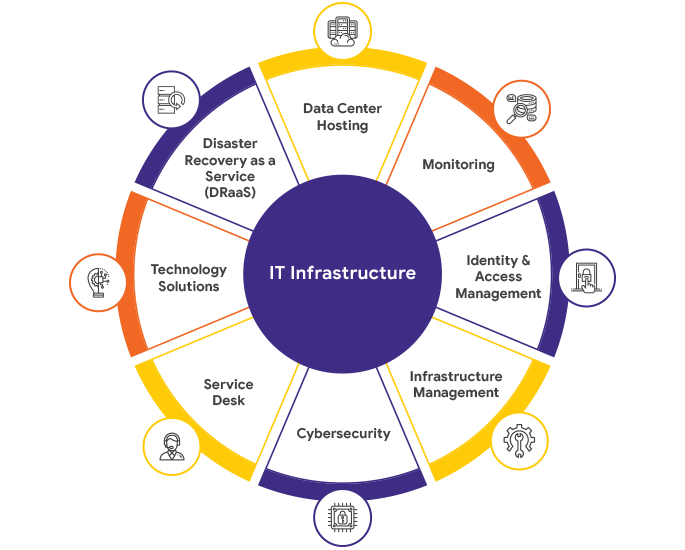
In today’s rapidly evolving digital landscape, organizations across industries are increasingly turning to emerging technologies to drive innovation, enhance efficiency, and gain a competitive edge. From cloud computing and artificial intelligence to blockchain and the Internet of Things (IoT), emerging technologies offer immense potential to transform business operations and deliver value to customers. However, the successful adoption and integration of these technologies depend on robust IT infrastructure services that provide the foundation for innovation. In this blog, we’ll explore how IT infrastructure services drive innovation by enabling organizations to harness the power of emerging technologies effectively.
Understanding IT Infrastructure Services:
IT infrastructure services encompass a broad range of technologies, tools, and resources that support the operation, management, and maintenance of an organization’s digital infrastructure. These services include network infrastructure, servers, storage systems, databases, cybersecurity solutions, and cloud computing platforms, among others. IT infrastructure services play a critical role in ensuring the availability, reliability, and scalability of digital resources, enabling organizations to streamline operations, enhance productivity, and deliver seamless experiences to users.
The Role of IT Infrastructure Services in Driving Innovation:
1. Facilitating Scalability and Flexibility:
One of the key benefits of IT infrastructure services is their ability to scale resources dynamically in response to changing business needs. Cloud computing platforms, for example, enable organizations to provision compute, storage, and networking resources on-demand, allowing them to scale up or down as required without the need for significant upfront investment in physical infrastructure. This scalability and flexibility empower organizations to experiment with new technologies, launch innovative products and services quickly, and adapt to evolving market conditions with agility.
2. Supporting Emerging Technologies:
Emerging technologies such as artificial intelligence (AI), machine learning (ML), and the Internet of Things (IoT) rely on robust IT infrastructure services for data processing, storage, and analysis. High-performance computing clusters, distributed storage systems, and advanced networking infrastructure provide the computational power and connectivity needed to support AI and ML algorithms, enabling organizations to derive actionable insights from large volumes of data in real-time. Similarly, IoT devices require reliable network connectivity, edge computing capabilities, and secure data transmission channels provided by IT infrastructure services to enable seamless integration and operation within the organization’s digital ecosystem.
3. Enhancing Security and Compliance:
As organizations embrace emerging technologies and digitize more aspects of their operations, ensuring the security and compliance of IT infrastructure becomes paramount. IT infrastructure services include cybersecurity solutions such as firewalls, intrusion detection systems, encryption technologies, and identity and access management tools that help safeguard digital assets, protect against cyber threats, and ensure compliance with industry regulations and data protection standards. By implementing robust security measures across their IT infrastructure, organizations can mitigate risks, build trust with customers, and foster a culture of innovation without compromising on security.
4. Enabling Collaboration and Communication:
Effective collaboration and communication are essential for driving innovation within organizations, particularly in today’s distributed and remote work environments. IT infrastructure services provide collaboration tools such as email, instant messaging, video conferencing, and document sharing platforms that enable teams to collaborate seamlessly across geographies, time zones, and devices. Cloud-based collaboration solutions offer centralized access to documents and resources, real-time communication capabilities, and integration with productivity tools, empowering teams to collaborate more efficiently and accelerate the pace of innovation.
5. Optimizing Performance and Efficiency:
IT infrastructure services help optimize the performance and efficiency of digital systems and applications, ensuring that they meet the demands of modern business operations. Performance monitoring tools, network optimization techniques, and automated management solutions enable organizations to identify bottlenecks, optimize resource utilization, and improve the responsiveness of critical systems and applications. By continuously optimizing IT infrastructure performance, organizations can enhance productivity, reduce operational costs, and create a conducive environment for innovation and growth.
6. Empowering Data-driven Decision Making:
Data is a valuable asset that fuels innovation and drives business success in the digital age. IT infrastructure services provide the foundation for collecting, storing, and analyzing data from diverse sources, enabling organizations to derive actionable insights and make informed decisions. Advanced analytics platforms, data warehouses, and business intelligence tools supported by robust IT infrastructure services empower organizations to extract meaningful patterns, trends, and correlations from large datasets, enabling them to identify new opportunities, optimize processes, and innovate more effectively.
Case Studies: Examples of Innovation Driven by IT Infrastructure Services

1. Netflix: Streaming Innovation with Cloud Computing
Netflix, the leading streaming entertainment service, revolutionized the way people consume content by leveraging cloud computing technology to deliver on-demand video streaming to millions of subscribers worldwide. By migrating its infrastructure to the cloud, Netflix gained the scalability, flexibility, and cost-efficiency needed to support its rapid growth and global expansion. The company’s use of cloud-based infrastructure services enabled it to innovate with personalized recommendations, adaptive streaming algorithms, and original content production, driving user engagement and market leadership in the streaming industry.
2. Airbnb: Disrupting Hospitality with Data-driven Insights
Airbnb, the online marketplace for short-term lodging and vacation rentals, relies on robust IT infrastructure services to collect, analyze, and leverage data to drive innovation and enhance the user experience. By harnessing the power of big data analytics, Airbnb gains insights into user preferences, market trends, and pricing dynamics, enabling it to optimize listings, personalize recommendations, and improve the overall guest experience. Airbnb’s use of IT infrastructure services empowers hosts to manage their listings efficiently, guests to discover unique accommodations, and the company to innovate with new features and services, driving growth and differentiation in the competitive hospitality industry.
3. Tesla: Transforming Transportation with IoT and AI
Tesla, the electric vehicle manufacturer, harnesses the power of IoT and AI technologies supported by robust IT infrastructure services to drive innovation and disrupt the automotive industry. Tesla’s fleet of electric vehicles is equipped with sensors and connectivity features that collect real-time data on vehicle performance, driver behavior, and road conditions. This data is processed and analyzed using AI algorithms to optimize vehicle performance, enhance safety features, and enable autonomous driving capabilities. Tesla’s use of IT infrastructure services enables it to continuously innovate with over-the-air software updates, adaptive features, and predictive maintenance, positioning the company as a leader in sustainable transportation.
IT infrastructure services play a foundational role in driving innovation by enabling organizations to harness the power of emerging technologies effectively. From scalability and flexibility to security and compliance, IT infrastructure services provide the essential building blocks that empower organizations to innovate, adapt, and thrive in today’s digital economy. By leveraging robust IT infrastructure services, organizations can unlock new opportunities, enhance operational efficiency, and deliver value to customers through innovative products, services, and experiences. As organizations continue to embrace emerging technologies and digital transformation initiatives, the role of IT infrastructure services in driving innovation will only become more critical in shaping the future of business and technology.


